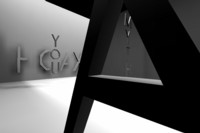The Daughters of Freya
Starting Monday (August 1) the Alternate Reality Gaming Network will host a group read of The Daughters of Freya. You can sign up on the site for The Daughters of Freya, at a price of $4 USD.
I read a “review copy” of The Daughters of Freya and found it an interesting experience. DoF isn’t usually performed for its readers simultaneously, as are email narratives such as Blue Company. Instead, usually any individual who signs up starts getting messages shortly after registering, which might make it seem more like Online Caroline in its approach. But — unlike Online Caroline in which you seem to be getting normal email messages from Caroline, with normal headers, today’s date, etc. — DoF doesn’t actually create a correspondence between the messages you receive and the messages characters send. A single message you receive might contain several messages from different characters, and the dates of the messages are driven by the story (which, in my reading, took place during a different time of year than my reading).
The result made me realize that there were more types of email narratives than I’d considered. DoF wasn’t trying to create the feeling of corresponding via email with a fictional character, nor of voyeuristically listening in on the email correspondence of others. Instead, it was using email to (a) change the context of reading and (b) build suspense.

 Thanks to
Thanks to 